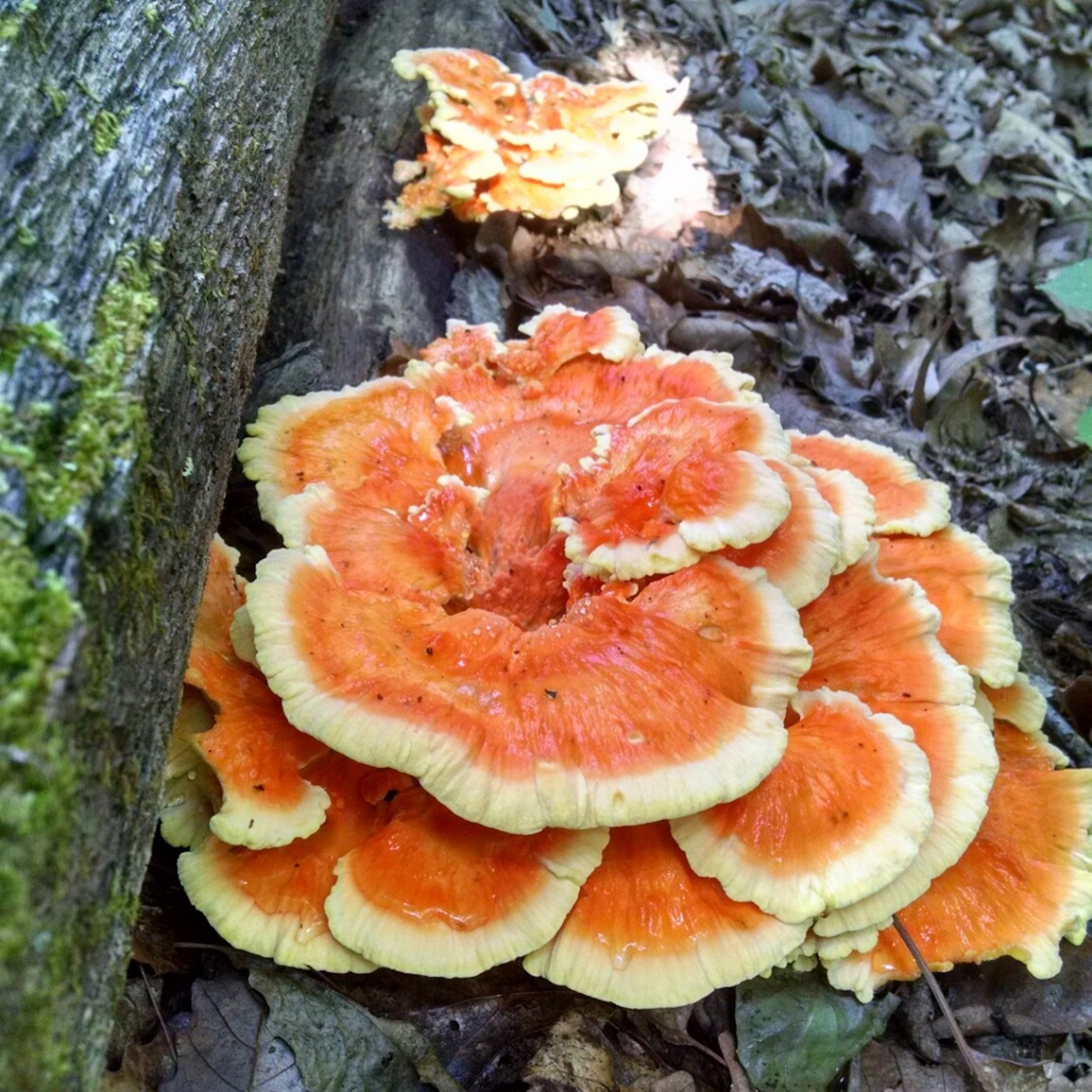Chicken-of-the-Woods: Medicinal Benefits
Chicken-of-the-woods mushroom growing wild on a fallen tree
Chicken-of-the-woods is the name usually given to the Laetiporus sulphureus mushroom due to its taste which is similar to chicken meat. Sometimes it’s just referred to as “chicken”. It’s also known by the name “sulfur shelf” because of its sulfur yellow color. It is found across the globe and its striking color makes it visible from far. It comprises several brackets and grows on higher trunks of trees, mostly oak in the wild.
The brackets of this mushroom can grow in large quantities and can weigh up to 45 kg. The tips of these brackets are often bright orange whereas old fruiting body color fades away with time. Chicken-of-the-woods mushroom is a natural reservoir of health-promoting compounds that have made it a popular component of several dishes.
Chicken-of-the-woods we wild harvested in the Southern Appalachian Mountains
Antioxidant Properties
Free radicals are common byproducts of the metabolic process in your body. However, their excess production has serious consequences for cell and tissue health. They damage the DNA in your cells and are the precursor for cancer, cardiovascular diseases, an impaired immune system, and atherosclerosis. Chicken-of-the-woods is an excellent source of antioxidants. A study found that the hot alkali extract of chicken-of-the-woods mushroom scavenges free radicals very efficiently[1]. The antioxidant properties are due to the α-glucan found in the mushroom, making it an excellent natural source of antioxidants.
Antibacterial Properties
Chicken-of-the-woods possesses inhibitory properties against a number of microorganisms. A study published in the journal of Food Chemistry in 2007 has reported that chicken-of-the-wood mushroom can mildly reduce the growth of gram-negative bacteria. However, significant antibacterial activity was reported against gram-positive bacteria including methicillin-resistant Staphylococcus aureus (MRSA), Candida albicans — a yeast that is a common member of human microflora whose overgrowth can cause skin disease — and Aspergillus flavus, a mold that produces a carcinogenic toxin[2].
Anti-inflammatory Properties
Inflammation, while a normal defense mechanism in our body, if over-expressed can cause serious health concerns. Chicken-of-the-woods has potential anti-inflammatory properties that can alleviate the risk of chronic diseases and disorders. The anti-inflammatory effects are due to the presence of exopolysaccharides (EPS) that protect the cells from damage[3]. EPS lowers the production of anti-inflammatory markers in our bodies. Anti-inflammatory effects have also been demonstrated for acetyl-EA acid found in L. sulphureus[4].
Anti Carcinogenic Properties
Chicken-of-the-woods mushroom has shown potential anti-cancerous effects in lab and animal models. The extract of this mushroom either inhibits the growth of cancer cells or speeds up cell death. A study published in the International Journal of Biological Macromolecules investigated the anti-tumor effects of chicken-of-the-wood mushrooms. The results indicated that these mushroom extracts inhibit the growth of tumor cells. The study also professes that chicken-of-the-wood mushroom can be an adjuvant in chemotherapy against colorectal carcinoma and melanoma[5].
Hormonal Balancing Properties
Recent research has reported that consuming chicken-of-the-woods mushroom can help increase the levels of estrogen in the body. This can treat hormonal balance problems and related health problems.. This could also be a solution for people who undergo radiation therapy and often face radiation damage associated with low levels of hormones.
Diabetes Treatment
A substance found in chicken-of-the-woods and certain other polypore mushrooms increases sensitivity to insulin and also improves several other processes related to diabetes, including reducing blood sugar in animals. The substance has promise as a possible treatment for Type II diabetes and related problems, such as obesity. A study that investigated the hypoglycemic effects of chicken-of-the-woods mushroom on diabetic rats found that chicken-of-the-wood mushroom extract could be a viable option for controlling diabetes[6].
Conclusion
In addition to its antioxidant, antibacterial, anti-inflammatory, anti-carcinogenic, and diabetes and hormone-regulating properties, chicken-of-the-woods is just plain delicious. Use some as a substitute in your favorite chicken dishes and enjoy knowing that you’re also consuming its many health benefits as well.
[1] The edible mushroom Laetiporus sulphureus as potential source of natural antioxidants International Journal of Food Sciences and Nutrition
[2] Antioxidant and antimicrobial activities of Laetiporus sulphureus (Bull.) Murrill sciencedirect.com
[3] Exopolysaccharide of Laetiporus sulphureus var. miniatus downregulates LPS-induced production of NO, PGE₂, and TNF-α in BV2 microglia cells via suppression of the NF-κB pathway. Food and Chemical Toxicology
[4] Acetyl Eburicoic Acid from Laetiporus sulphureus var. miniatus Suppresses Inflammation in Murine Macrophage RAW 264.7 Cells ncbi.nlm.nih.gov
[5] Lectin from Laetiporus sulphureus effectively inhibits angiogenesis and tumor development in the zebrafish xenograft models of colorectal carcinoma and melanoma International Journal of Biological Macromolecules
[6] Hypoglycemic Effect of Polysaccharides Produced by Submerged Mycelial Culture of Laetiporus sulphureus on Streptozotocin-induced Diabetic Rats [2010] Biotechnology and Bioprocess Engineering


